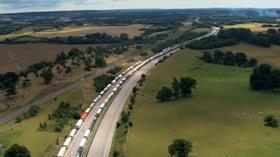
Gridlock at British ports resulting from a no-deal Brexit could see food imports left to rot according to an industry chief.
Tony Lewis, head of policy at the Chartered Institute of Environmental Health, said that tailbacks at the Channel border “may well see food rotting on the quay and shortages in the shops'.
Lewis said that even a two minute increase to the current two minute border checks on transport vehicles would create substantial gridlock in Dover.
Ongoing uncertainty over Brexit negotiations has caused anger among business owners who rely on the standardised European customs union for labour and trade.
Maritime UK warned that there could be “20-mile permanent traffic jams” from Dover if no arrangement is struck between Britain and Europe on transport and produce standards.
“We have been strongly raising concerns about this issue for some time in respect of food imports and future trade agreements,” Lewis said.
“Currently, internal market arrangements mean that food being imported to the UK from EU countries via the Northern Ireland border and Channel ports pass through checks in about 2 minutes, provided that paperwork is correct.
“In the absence of a transition period, and subsequent trade agreement, that maintains these arrangements there is serious concern that massive tailbacks and delays will appear on the first day post-Brexit. Even doubling the inspection time to 4 mins will generate substantial gridlock.”
Lewis added that new food safety checks would also increase transport time to the point of rendering it inedible.
“The reality, however, is that imported food checks and sampling to ensure that incoming food meets our standards will take much longer than a few minutes and could take days if the results of laboratory sampling is awaited.
“Over and above tailbacks at the ports, this will mean that the fresh food industry that currently operates on a ‘just in time’ basis may well see food rotting on the quay and shortages in the shops.”






No comments yet